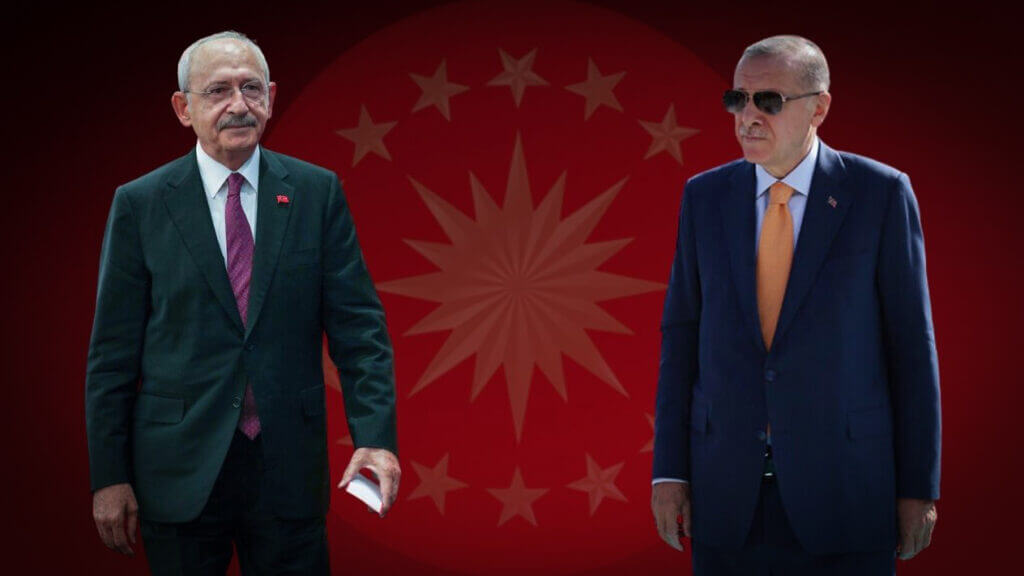Turkish pollsters are engaging in self-criticism and reviewing their methodologies since the result of Turkey’s May 14 presidential election bore no resemblance to their predictions, which had pointed to the opposition candidate in the lead, while it was President Recep Tayyip Erdoğan who came out ahead in the race.
Turkey will hold a presidential runoff on May 28 since initial results showed Erdoğan failing to secure a win against his secular rival, Kemal Kılıçdaroğlu.
According to unofficial and temporary results in the May 14 presidential election, Erdoğan received 49.5 percent of the vote, while Kılıçdaroğlu, the candidate of the Nation Alliance, an opposition bloc of six political parties, garnered 44.8 percent.
Erdoğan’s People’s Alliance, comprising of his Islamist-rooted Justice and Development Party (AKP) and its nationalist partners, also appeared set to win a majority in the new parliament with 321 of the 600 seats.
While a number of pollsters had predicted a majority for the People’s Alliance in the parliamentary elections, the far-right Nationalist Movement Party (MHP) — part of the governing alliance — did much better than forecast.
Pollsters are examining their methodologies to figure out where their surveys went wrong ahead of a vote seen as one of the most important in Turkish history.
For weeks leading up to the election, opinion polls from numerous companies consistently positioned Kılıçdaroğlu ahead of Erdoğan. These poll results seemed to align with the prevailing perception that Erdoğan’s popularity had been affected by skyrocketing inflation and a cost-of-living crisis in Turkey.
One polling company, MAK, showed Kılıçdaroğlu winning 50.9 percent in the presidential race, enough to secure a win, in a survey published on May 7.
MAK Chairman Mehmet Ali Kulat told Reuters earlier this week that conducting surveys had been made harder by factors including the massive earthquakes that struck Turkey in February and the Muslim holy month of Ramadan, which ran from March to April.
“There was a 20-day period after Ramadan and you cannot legally conduct polls in the last 10 days. These made us stray further. We, as research companies, should not find excuses,” he told Reuters.
In its latest survey conducted on May 6-7, the KONDA polling company showed the support for Kılıçdaroğlu at just below 50 percent, while the Turkey Report, which released its final survey on May 12, two days before the election, revealed a vote estimate of 50.5 percent for Erdoğan’s main rival.
Following the election, Turkey Report Director Can Selçuki said in a tweet that he would “not hide behind the margin of error” to justify his company’s inaccurate prediction, but conduct a thorough evaluation and share detailed information with the public about where and why mistakes were made.
“Starting today, we will review our methodology and make corrections to our errors as we continue to strive to measure, understand, and communicate the public’s perspectives on various issues,” Selçuki said.
Seçimden önce 11 ve 12 Mayıs tarihlerinde iki tane tahmin yayınladık. Her ikisinde de hata payı içinde bulduğumuz ve bulmadığımız sonuçlar var.
Ancak hatalı tahmini hata payının arkasında gizleyecek değilim.
Bunun muhasebesini yapıp nerede ve neden hata yapıldığına dair…
— Can Selcuki (@CanSelcuki) May 15, 2023
Meanwhile, political observer, pollster and owner of MetroPoll Professor Özer Sencar on Thursday told Deutsche Welle Turkish service it was a mistake to conduct a second survey in May since it turned out that the results of the initial one closely aligned with the results of the presidential race.
In its poll conducted May 10-11, Metropoll found Kılıçdaroğlu at 49.1 percent and Erdoğan at 46.9 percent. However, it was later revealed that the company initially conducted a survey May 4-5-6 and found Erdoğan at 49.5 percent and Kılıçdaroğlu at 44.7 percent. This raised questions about the company since the results of the first survey were only shared with subscribers and the second one with the public.
Sencar explained that their reason for conducting a second survey was to observe the effect of an attack on the campaign bus of İstanbul Mayor Ekrem İmamoğlu in early May on the voters’ choices but that they were wrong to think that it would have a significant impact on the electorate.
Seventeen people suffered minor injuries when protestors pelted the İstanbul mayor’s campaign bus with stones while he was touring Erzurum ahead of the May 14 presidential and parliamentary elections.
“Turkey – I assume no one is reading opinion polls before second round vote,” economist Timothy Ash of BlueBay Asset Management said in a tweet, referring to the pollsters’ failure at predicting the results of the first round.
Turkey – I assume no one is reading opinion polls before second round vote.
— Timothy Ash (@tashecon) May 19, 2023
Meanwhile, allegations of fraud have been raised following elections in Turkey, with concerns about irregularities, manipulated media coverage and manipulation of voting results coming to the fore. The claims were raised by the jailed Kurdish leader Selahattin Demirtaş, former co-chair of the pro-Kurdish Peoples’ Democratic Party (HDP), and the Workers’ Party of Turkey (TİP) in addition to many other opposition figures and social media users. According to critics, the alleged irregularities were systematic and large enough to influence the election in favor of the AKP and Erdoğan.
